Tom Longworth's 10 steps to session success
Robbie WIlliams' guitarist talks business
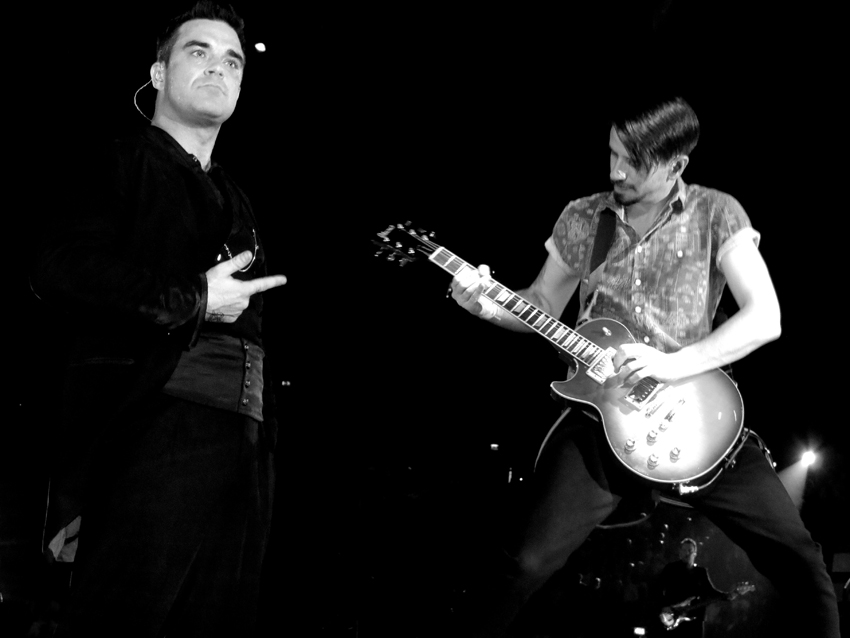
Nail the audition!
“I used to be in my own band in the late ‘90s, doing original stuff. The drummer in the band was [Robbie Williams drummer] Karl Brazil.
"The music scene was different back then. It was 'start a band, play gigs, get a manager,' and that was it. It got to the point where I was in my late 20s and other guys in the band were getting married, and it became difficult to do the band without any money.
"I was offered a gig playing with Natalie Imbruglia. Karl had moved into the session world, and he offered me that gig.
"Karl later got the gig with Robbie Williams and also Paul Beard is Rob’s MD, and I had played with Paul before. Rob wanted a new guitarist, and I was down on the shortlist. I did two weeks of rehearsals in LA and did a private show for Philip Green’s 60th birthday in Cancun. It was massive. Stevie Wonder was playing, and Simon Cowell, Ronnie Wood and Matt Bellamy were all there. That gig was my audition.”
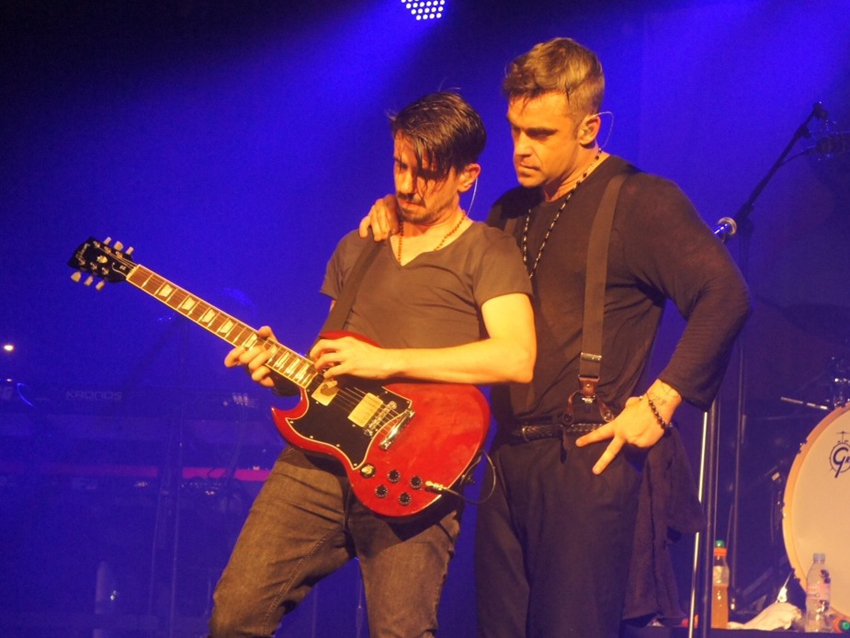
Get the right gear
“Equipment is a big thing - you need to get the tone right.
"I had just been playing Gibson, but I had to get a Strat and a Tele and invest a lot of money in the correct gear. If you’re starting out in that session world, that is one of the main things.
"You need a nice Strat, a Tele and a Les Paul. If you’ve got those three, you’re rockin’. It’s good to have a nice clean Fender amp as well, and loads of pedals.”
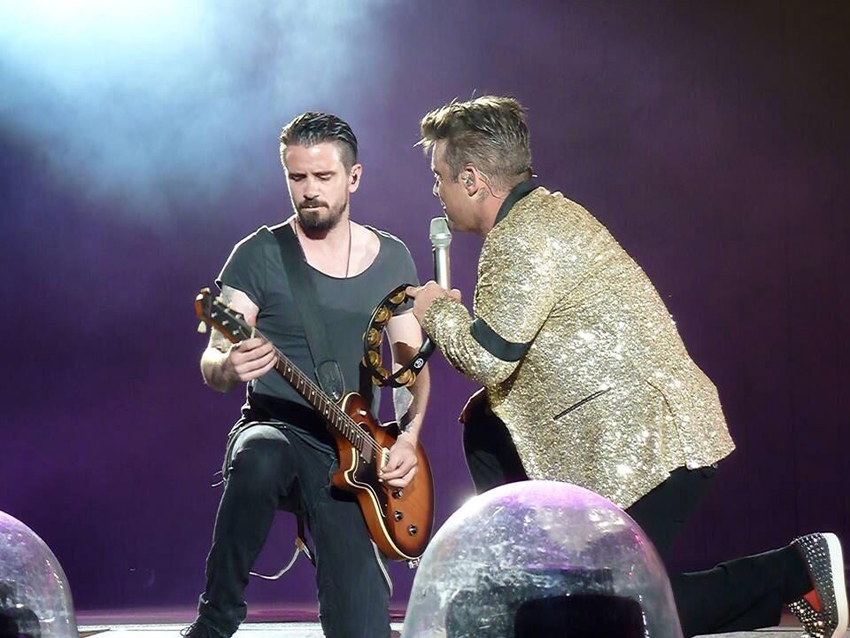
Be versatile
“It was hard for me to begin with because I’d played in my own band for nearly 10 years.
"I had to learn all of these different songs and copy other people’s playing. I had to adapt to that. I had been playing rock and funk, and all of a sudden had to do a lot of slide playing and pop.
"You have to be versatile. It’s good to have lots of styles under your belt. In the pop world, you need a rock element, and I like to have blues stuff going on.
"You have to be able to adapt to every situation - country, jazz, indie rock, dance. Robbie’s stuff spans three decades, and he’s also done swing.”
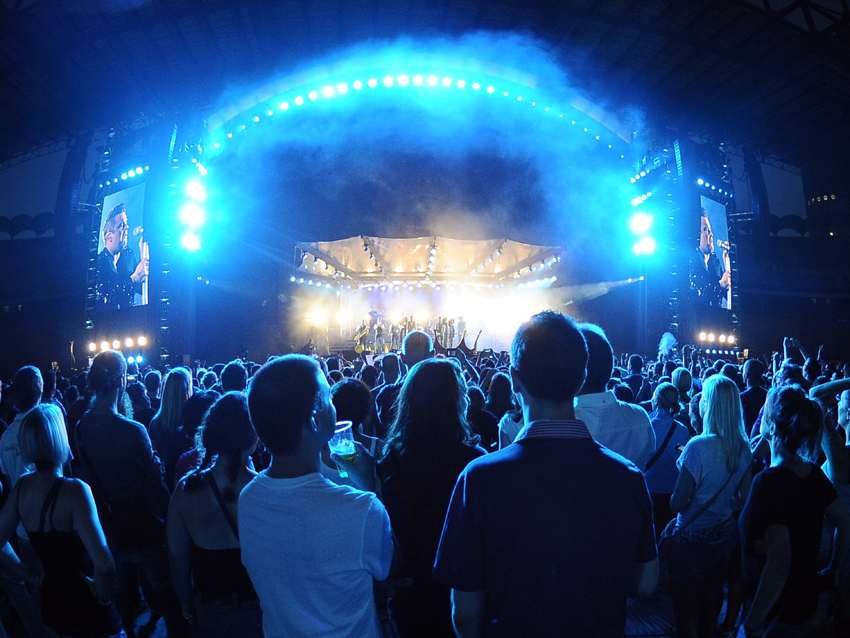
Don't be scared of the stadiums
“I thought it’d be a lot harder to go play a stadium than it actually is. I was surprised that it isn’t that different to doing, say, the O2.
"The O2 is 20,000, and then Wembley is 80,000, but there isn’t much difference on stage. I didn’t feel intimidated in a stadium; there’s such a big space between you and the audience, whereas the smaller gigs can be a little bit more daunting. As soon as you’ve got the O2 under your belt, you can do anything.”
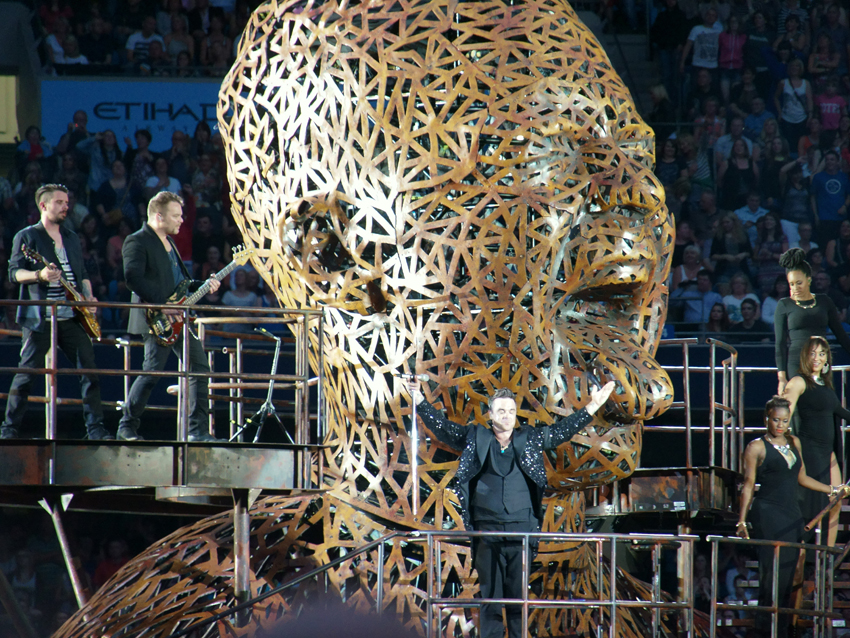
Get used to miming - and have a laugh
“These days a lot of TV appearances tend to be mimed, so you can just have a laugh.
"For a guitar player, there’s rarely a shot of your hand, so there are no nerves if you’re miming - you can just have fun. As long as you’re playing the right chords, you’ll be fine. It’s very relaxed.
"Even as a musician, I will watch shows sometimes and not realise straight away if the band is playing live or miming. Obviously, Nirvana used to have fun with miming and make it obvious, and I saw an Italian show where Muse were miming and all swapped instruments.
"But, if you’re playing for someone like I am with Robbie, then you have to make it look as good as possible. I have also done a few live TV ones, and they can be daunting because you have to get it right, and you don’t get a second take. With those, you just have to treat it like a live gig, and it’ll take care of itself.”

Make friends and influence people
“Looking at someone like Karl Brazil, he always says that a lot of this business is personality.
"You have to get on with everyone, be on time and not cause arguments. If not, then people won’t use you again. Karl always told me to just keep my head down, do a good job and be fun to be around.”
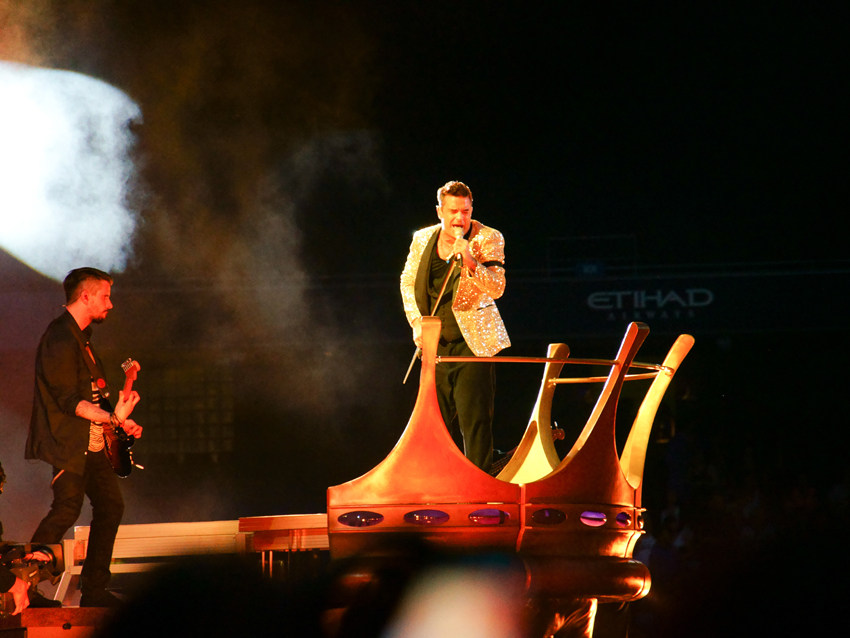
Keep your gear in top shape
“There’s nothing worse than turning up and your gear doesn’t work.
"When you get to Robbie’s level, you don’t have to worry about it so much because everything is done for you. But if you’re doing something smaller, you have to turn up with everything in full working order.
"On the Robbie gig, I use a Marshall JCM 800 head running next to a Marshall Vintage Modern. I like having those two running a little bit hot so you can get a nice driven tone.”
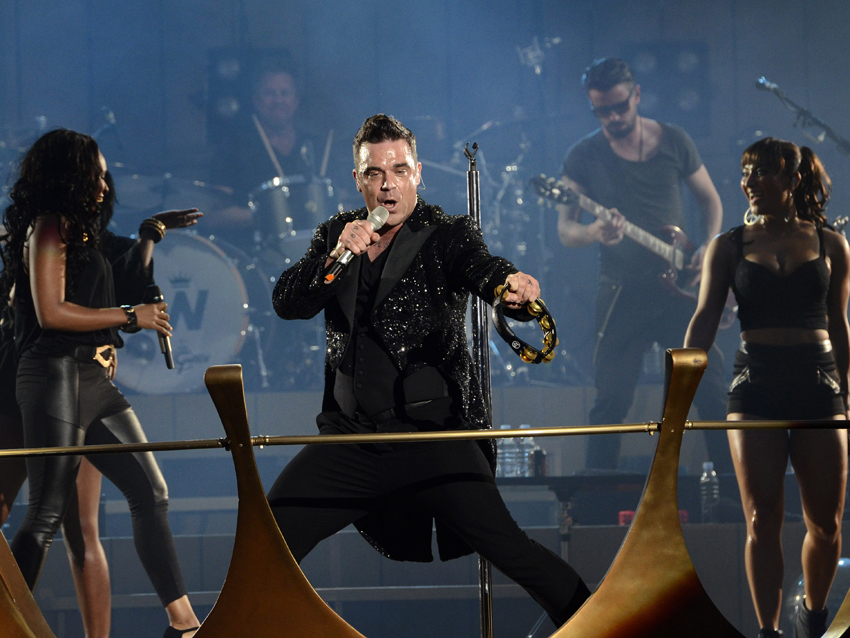
Get networking
“The business is probably 30 percent your playing, 30 percent personality and 40 percent networking. It’s not what you know, it’s who you know.
"For me, knowing Karl and Paul was massive. You should use the internet as well. I’ve been offered gigs on Facebook because I’ve friended someone on there that is an MD.
"You can sit at home and rehearse, but you need to get out there. I had about a year without a gig, so I’d go out to jam nights because I knew people would be there.
"People need to see you playing. You might get a small gig out of it, and you never know who you’ll bump into and what it could lead to.”
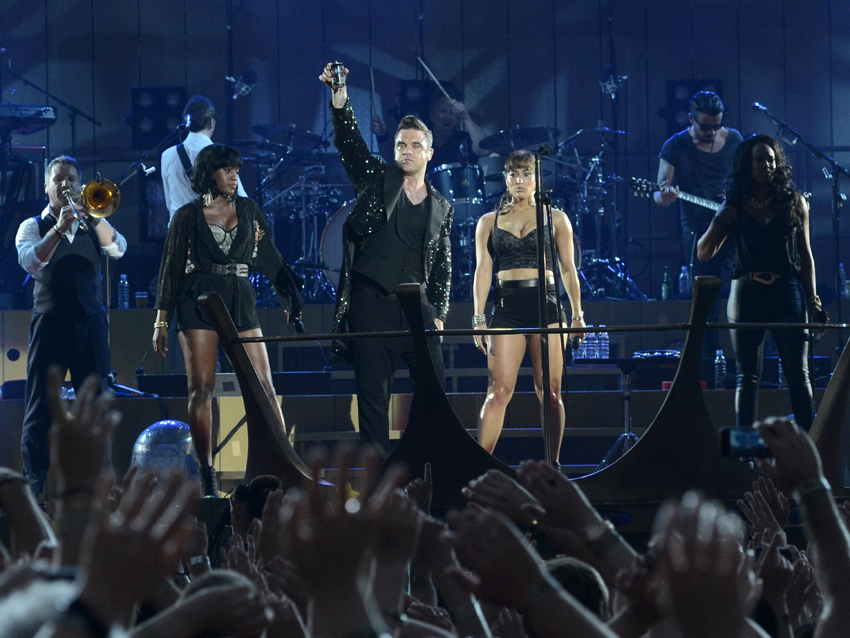
Relax
“I was so engrossed in learning the material and making sure I had it down that I kind of forgot I was working with Robbie Williams.
"It was almost like it was a cover gig, and then it got to the gig and it was like, ‘Oh, shit, I’ve got to meet Rob. This is real!’ By the time I got to the bigger gigs, I felt really comfortable. If you’re worried about working with a big artist then it won't help you play well.
"You need to relax. If you’re in a band with the correct people, they’ll make you relaxed. I’ve done gigs before where I’ve been worried about making mistakes, and nine times out of 10 that comes from the artist being like that, like when James Brown would point at the band and dock their wages if they made a mistake. Rob will just say, ‘Go out and have fun.’”
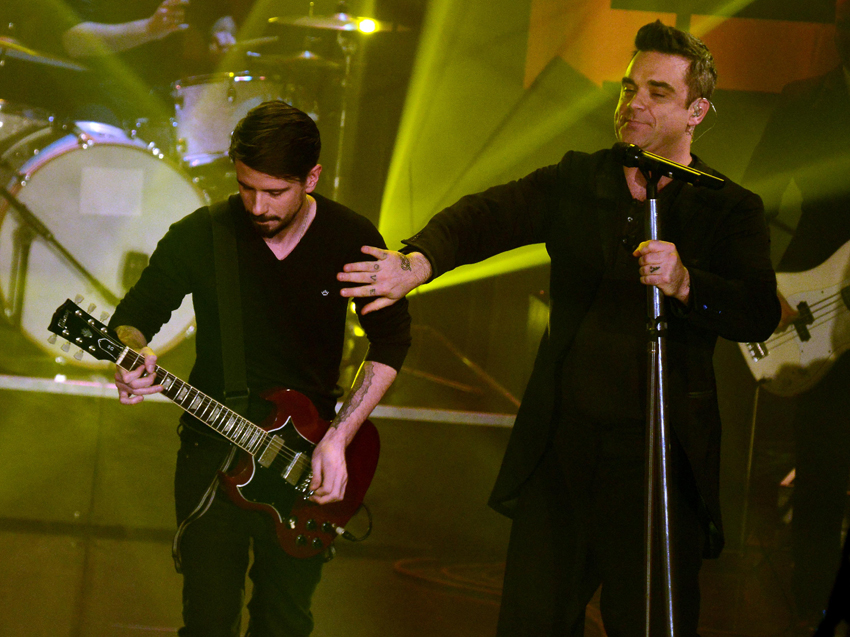
Rehearse, rehearse, rehearse
“You need to rehearse as many styles as you possibly can, even if it’s just basic blues, rock, funk, jazz - you need knowledge of all of those.
"Then just get out there and meet as many people as possible, and play with other people as much as possible. You learn a lot more playing with other people compared to playing on your own.”
Rich is a teacher, one time Rhythm staff writer and experienced freelance journalist who has interviewed countless revered musicians, engineers, producers and stars for the our world-leading music making portfolio, including such titles as Rhythm, Total Guitar, Guitarist, Guitar World, and MusicRadar. His victims include such luminaries as Ice T, Mark Guilani and Jamie Oliver (the drumming one).
